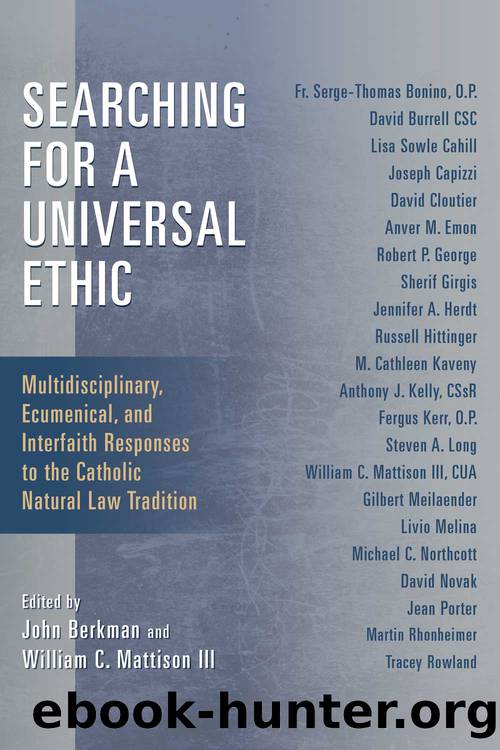Searching for a Universal Ethic by Berkman John;Mattison William C.;

Author:Berkman, John;Mattison, William C.;
Language: eng
Format: epub
Publisher: Wm. B. Eerdmans Publishing Co.
Published: 2014-11-11T13:45:46+00:00
Conclusion
In conclusion, the In Search of a Universal Ethic document recognizes the problems inherent in a rationalist account of natural law and the need to include a role for prudence and emotional intelligence in the discernment of, and receptivity to, the principles of natural law. These recognitions are welcome developments. However, when dealing with the question of the search for a universal ethics the document points to harmonious elements across the various wisdom traditions and religions of the world but does not address the âelephant in the room,â that is, the value of the natural law and natural right idioms when dealing with contemporary liberal and postmodern interlocutors who reject the whole notion of creation and a stable and intelligent order within it. Perhaps part of the problem here is that the Church is dealing with a complex array of issues that transgress disciplinary boundaries. The ITC is concerned with the theological dimensions of the issue, but a strategic plan for dealing with the array of issues would require a supplementation of the theological work with the insights of intellectual and social historians as well as political and linguistic philosophers. It would also require the theologians to work on the issue of just how much of the theological dimensions of the natural law doctrine need to be exposed. How one answers this question depends on how one understands the relationship between nature and grace, and the relationship between faith and reason. Currently there is not one Catholic version of natural law, but several, running on different nature and grace, and on different faith and reason, foundations. The In Search of a Universal Ethic document does not buy into these foundational issues, which will need to be resolved before there can be any common Catholic account of natural law. As it stands, however, the documentâs call to move beyond a rigidly rationalist account of natural law is sympathetic to the kinds of approaches fostered by Pinckaers, Hibbs, Levering, Schockenhoff, Sokolowski, von Hildebrand, and Ratzinger, which may at least mean that references to natural law might be less of a blunt instrument when dealing with those who believe that there is a logos within creation. In contrast, the mid-Âtwentieth-Âcentury bracketing of theological commitments to engage with others on the basis of natural law tended to acquiesce to a central liberal and Romantic-ÂNietzschean move that in effect subverted (rather than simply bracketed) those commitments.
The question of how best to engage the proponents of the liberal and Romantic and/or genealogical traditions remains an urgent work in progress. For those who have been formed within these traditions the idioms of natural law and natural right are not a lingua franca shared with theists but the very battlefield on which their fight for a culture of death will be fought. For as long as Catholic scholars keep their heads firmly in the sand over this, the younger generation of Catholic leaders will be without a game plan.
1. Joseph Ratzinger, Values in a Time of Upheaval (San Francisco: Ignatius, 2006), 38-39.
Download
This site does not store any files on its server. We only index and link to content provided by other sites. Please contact the content providers to delete copyright contents if any and email us, we'll remove relevant links or contents immediately.
The Secret Power of Speaking God's Word by Joyce Meyer(3152)
Signature in the Cell: DNA and the Evidence for Intelligent Design by Stephen C. Meyer(3121)
Real Sex by Lauren F. Winner(3001)
The Holy Spirit by Billy Graham(2937)
The Gnostic Gospels by Pagels Elaine(2515)
Jesus by Paul Johnson(2347)
Devil, The by Almond Philip C(2322)
23:27 by H. L. Roberts(2241)
The Nativity by Geza Vermes(2220)
Chosen by God by R. C. Sproul(2151)
All Things New by John Eldredge(2149)
Angels of God: The Bible, the Church and the Heavenly Hosts by Mike Aquilina(1948)
The Return of the Gods by Erich von Daniken(1925)
Angels by Billy Graham(1915)
Knowing God by J.I. Packer(1844)
Jesus of Nazareth by Joseph Ratzinger(1797)
The Gnostic Gospel of St. Thomas by Tau Malachi(1779)
How To Be Born Again by Billy Graham(1775)
Evidence of the Afterlife by Jeffrey Long(1773)
